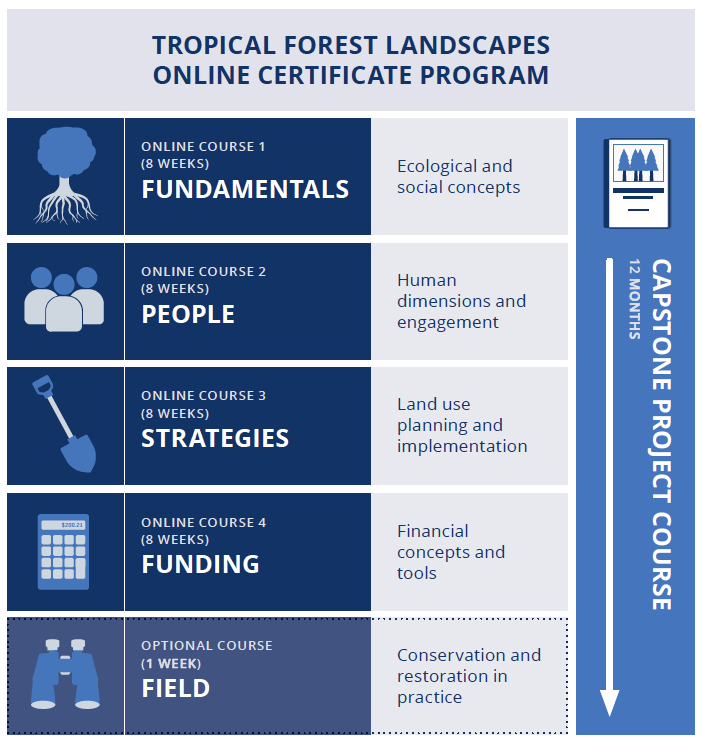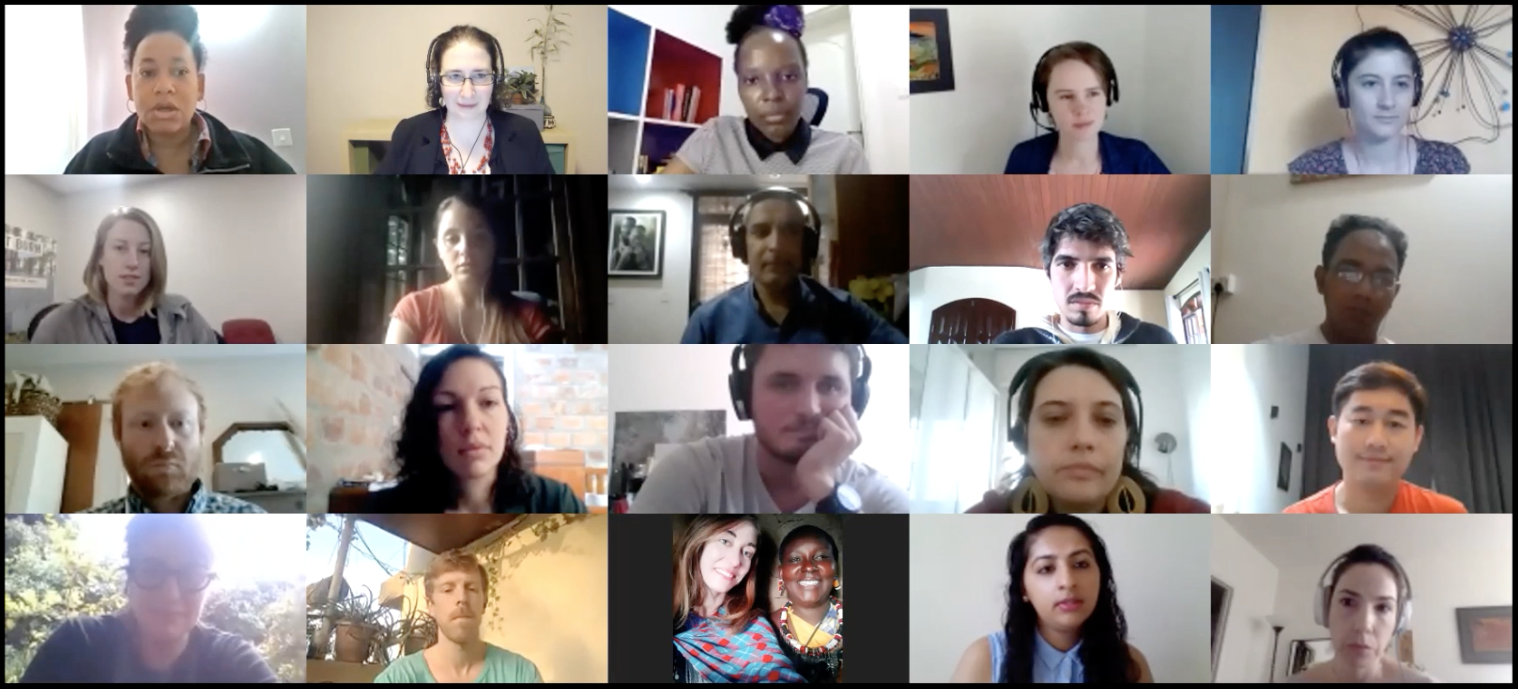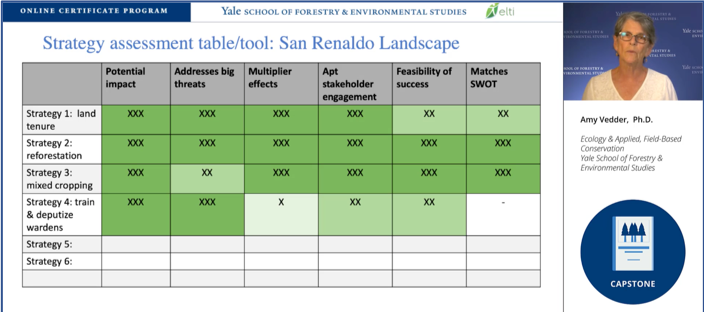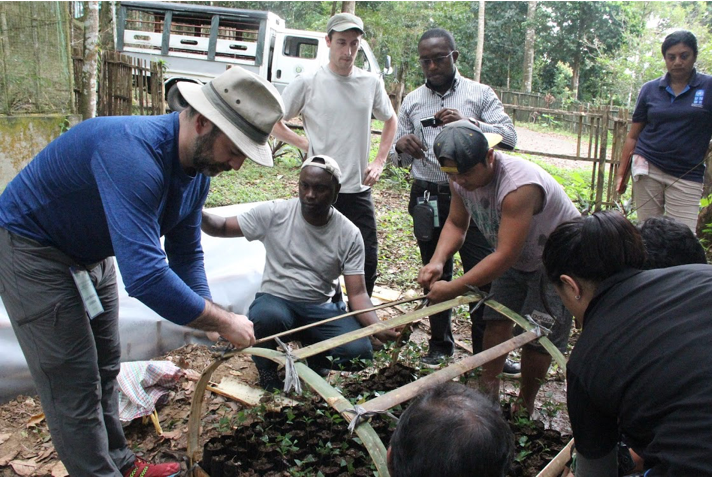CURRICULUM
This program builds on ELTI's decade of experience with high-touch, experiential online learning. Our diverse team of Yale instructors and global experts showcase scientific theory and practice, highlighting experiences and perspectives from around the world.
Program Structure

This program includes:
- Four core courses (8 weeks each): Dive deep into four core themes and build an interdisciplinary understanding of tropical forest landscape management.
- Capstone project course (12 months): Learn tools for project planning and put learning into practice as you develop an implementable project plan.
- One optional field course (1 week): Experience concepts coming into life on-the-ground through an experiential tour of a tropical forest landscape.
What to Expect?
Access high quality content, engage with diverse participants and experts and build your skills. Each week offers a chance to explore new concepts, tools, and perspectives about sustainably managing tropical forest landscapes.
The program is designed to be flexible with your work schedules and committments, requiring around six hours of coursework per week. All required coursework is online, meaning you can study from anywhere in the world, at your own pace.
Content
Engage with the course themes through 130+ recorded video lectures and case studies presented by 70+ international guest experts. Additionally, participants access curated course libraries containing cutting-edge scientific research, synthesis papers and practical guides.
Interaction and exchange
Develop a network and community of practice with instructors and peers in weekly live sessions and discussion forums.
 Image: Peer-to-peer live discussion among participants of the 2020-2021 program cohort.
Image: Peer-to-peer live discussion among participants of the 2020-2021 program cohort.
Practical assignments
Practice skills and apply knowledge through weekly reflections, skill-building assignments, and an implementable project — all with feedback from the experts.
 Image: Dr. Amy Vedder describes a Capstone exercise to assess and prioritize project strategies.
Image: Dr. Amy Vedder describes a Capstone exercise to assess and prioritize project strategies.
Capstone Project
Develop a suite of project tools to apply to a real-world project in the yearlong Capstone project course. Learn underlying principles of project planning, practice techniques, and apply concepts to the project of your choice.
Lead Instructor
Dr. Amy Vedder (subject to change)
Sample Course Overview (2020)
Build your skills
- Design and plan a specific conservation and restoration project—these can be field initiatives, policies, and programs at any scale
- Practice concepts and tools of each course and apply them to your initiative
- Receive feedback from faculty members, mentors and peers
- Learn about the initiatives that your peers are planning
- Boost your presentation skills
- Create a robust project plan for your initiative and develop skills to make it happen
Fundamentals: Ecological and Social Concepts
Build a foundation in important ecological and social concepts. Explore the importance of tropical forests, develop an understanding of global processes and drivers, and begin planning your own project.
.png)
Lead Instructors
Dr. Mark Ashton & Dr. Amity Doolittle (subject to change)
Sample Course Overview (2023)
Build your skills
- Learn ecological principles that govern the disturbance and recovery of tropical ecosystems
- Understand and leverage ecological processes when considering conservation and restoration strategies
- Evaluate historical context and perspectives and how they influence current social dynamics and land uses
- Learn how governance and social dynamics influence different motivations and opportunities for conservation and restoration
- Incorporate knowledge from many disciplines and perspectives into project and program design and planning
- Learn about monitoring and evaluation and how careful design of a monitoring strategy is instrumental to project success
People: Human Dimensions and Engagement
Learn about the complex socio-economic and political factors that drive the actions and decisions of stakeholders in forest landscapes. Evaluate your own social context, while considering how to avoid adverse social outcomes for projects.
.png)
Lead Instructors
Dr. Eva Garen & Dr. David Neidel (subject to change)
Sample Course Overview (2023)
Build your skills
- Evaluate existing assumptions and biases and recognize unintended consequences of activities
- Understand the larger socio-economic and political contexts that drive the actions of people and communities in forest landscapes
- Examine and “unpack” the complexities of political and social stratification in communities and stakeholder groups
- Recognize how management and access to resources differ among stakeholders and learn how to adapt activities to avoid exacerbating inequalities
- Develop an understanding of various land tenure and knowledge systems in order to support sustainable practices
- Apply tools and frameworks to engage people and institutions in different contexts and at varying scales
Strategies: Land Use Planning and Implementation
Develop the skills to assess and plan on-the-ground conservation and restoration activities. Integrate what you learn about social and biophysical considerations to create locally adapted strategies.

Lead Instructors
Dr. Florencia Montagnini, Dr. Luke Browne, Dr. Oswald Schmitz (subject to change)
Sample Course Overview (2020)
Build your skills
- Understand the importance of a landscape approach to conservation and restoration to preserve ecological functionality in multi-use landscapes
- Analyze how the degree of degradation, relevant landscape elements and social drivers of landscape change (past, current, future) influence appropriate strategies
- Evaluate the range of land use interventions, their advantages and disadvantages, and how to apply conservation and restoration activities
- Learn how the sustainable management of forests and agricultural lands can advance conservation, restoration and production goals in mosaic landscapes
- Identify the principles underlying key ecosystem services (soil conservation, water filtration, biodiversity conservation, carbon storage and climate change resiliency) and design interventions that promote their recovery
- Learn basic principles for the design of payments for ecosystem services schemes
Funding: Financial Concepts and Tools
Learn where funding for conservation and restoration comes from and how to match your project with financial support. Develop a project budget and funding plan while exploring the world of conservation finance.

Lead Instructors
Namrita Kapur, MBA & MEM and David Meyers, MBA & PhD (subject to change)
Sample Course Overview (2024)
Build your skills
- Understand how the potential for revenue influences decision-making about which funding sources are most appropriate for conservation and restoration initiatives
- Assess the relevance, risks and opportunities for charitable donations, public programs and for-profit investment to your proposed initiatives
- Identify potential funding sources, learn strategies to secure funding and address associated trade-offs
- Develop a project budget and practice applying financial concepts
- Recognize how different contexts - type of project, location, other factors - enable or limit access to different kinds of funding
- Consider how best to communicate with potential project funders, so that funding “pitches” can best meet their needs and expectations
Field Course (Optional): Conservation and Restoration in Practice
Immerse for one week in the tropics, apply theory to practice and learn about what is happening on the ground.
- Dates to be announced
- 6-Day Field Course
Lead Instructors
Field instructors vary based on location.

Build your skills
- Visit demonstration sites where conservation and restoration initiatives take place
- See in detail what it takes to make a project plan become an initiative carried out on the ground
- Meet environmental leaders — including land owners, farmers, ranchers and extension workers — who are making a difference in the field
- Practice skills that you gained in the online courses and capstone project
- Enhance your teamwork skills and develop a community with your peers, instructors and environmental leaders in the topics
Possible locations
Each year, the field course will take place at one of ELTI's training landscapes in the tropics. Location will be determined based on the interest and availability of accepted participants and partner organizations working on-the-ground. The 2024 field course will be:
Brazil (2024)
Primary partners: Institute for Ecological Research (IPÊ); Federal University of Southern Bahia (UFSB)
ELTI’s Brazil site is located in the south of Bahia state, Brazil in the Atlantic Forest biome. The Brazilian Atlantic Forest biome stands out for its remarkable levels of endemism and species diversity. Participants will deepen their understanding of tropical rainforest ecology and strategies for forest restoration and conservation in a complex human-dominated landscape. Participants will meet with local organizations and landowners who are pioneers in regenerative agriculture, native species reforestation, and agroforestry systems.

Previous field courses were held in:
Colombia (2023)
Primary partner: Center for Research on Sustainable Agricultural Production Systems (CIPAV)
This course was held at two landscapes in the Valle del Cauca region: El Hatico Nature Reserve and the Smallholder Community of Bellavista. Over six days, participants deepened their understanding of sustainable land use and restoration by visiting demonstration sites, learning about agroforestry, silvopastoral and restoration practices, and understanding the role of participatory research and generational exchange. By interacting with farmers and local community members who have transitioned to sustainable land use practices and committed to conservation, participants learned about the values and motivations of people who have worked hard to enhance their livelihoods and the environment.

Panama (2023)
Primary partners: Achotines Research Station and the Association of Livestock; Agro-Silvopastoral Producers of Pedasí (APASPE)
Panama's Azuero Peninsula is a largely deforested dry tropical ecosystem comprised of a mosaic landscape of cattle ranching, subsistence and commercial agriculture, tourism development and forest fragments. On a variety of interpretive trails, research sites, demonstration areas, and silvopastoral model farms, participants engaged in hands-on field activities and interacted with local landowners and community associations to learn firsthand about motives, strategies, and challenges for land management decisions.
.png)
Philippines (2020 & 2023)
Primary partner: Visayas State University (VSU)
On the island of Leyte, the landscape is largely dominated by the production of corn, coconuts, sugarcane and irrigated rice. Participants deepened their understanding of tropical forest ecology by visiting a Key Biodiversity Area, learning about the origins of the native species reforestation approach called Rainforestation, visiting demonstration sites, conducting a site assessment, propagating forest tree species, helping develop a Rainforestation site, and learning about ongoing research and applied conservation and restoration efforts. They will also learn how the Rainforestation process addresses complex land tenure and other governance challenges. Participants will interact with local community members and community organizers who have implemented Rainforestation to understand their motives and experiences.
.png)
.png)